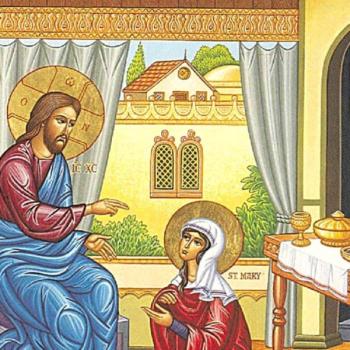“Mary’s Song,” as most Bible headings print in bold font, is Luke 1:46-55. It’s spoken during Mary’s visit to Elizabeth, right after a pregnant Elizabeth feels the soon-to-be John the Baptist stir within her. At this point in the story, both Mary and Elizabeth know they are pregnant with the future; they are literally living – and carrying prophecy. In that moment, full of realization…companionship…and prophecy…Mary speaks. She wasn’t just talking about herself (as some churches surmise); she was also speaking prophecy.

Carl Bloch (Danish, 1834-1890) (Public Domain)
And Mary said:
“My soul glorifies the Lord and my spirit rejoices in God my Savior,
for He has been mindful of the humble state of His servant.
From now on all generations will call me blessed,
for the Mighty One has done great things for me—holy is His Name.
His mercy extends to those who fear Him, from generation to generation.
He has performed mighty deeds with His arm; He has scattered those who are proud in their inmost thoughts.
He has brought down rulers from their thrones but has lifted up the humble.
He has filled the hungry with good things but has sent the rich away empty.
He has helped his servant Israel, remembering to be merciful
to Abraham and his descendants forever, just as He promised our ancestors.” (NIV)
Mary’s prophecy
Mary’s prophetic words echo a powerful truth about prophecy. Prophetic word has three contexts to it:
- It has a literal interpretation, one that is for the day in which it’s spoken
- It has an understanding that is futuristic, often foretelling some part of the time of the end
- It has a context that can be understood in any time
Mary spoke words that were literal to her pregnancy with Christ, but also spoke of a day that was yet to come. As the Word literally dwelt within her, she saw a future promise: a vision of the time before He would come again. When He is to return, He will not be a baby. Instead, He will appear for those waiting for Him (Hebrews 9:28). A dawn was coming; a paradigm was shifting; and Mary was part of that prophecy. She was the first in her day and age to see the change that began with Christ’s birth and the change that would continue down the ages, right down to the final time.
In understanding her prophecy, I think Mary offers us a perspective about it that many overlook. Mary’s words spoke of the power of living the prophetic, right now. She didn’t try to turn it upside down or make it any more than it was. Her words were simple with profound truth behind them. In this, she recognizes the reality of prophecy’s ability to transform the challenges we experience in our everyday lives.
We tend to overlook the fact that Mary’s decision to birth the Messiah came with everyday, ordinary challenges she would face forever. And in her prophetic words, she realized those challenges were small in the face of eternity. That’s what prophecy does for us.
Everyday prophecy
Understanding prophecy is deeper than we often see in the modern church. While there’s no question in my mind that prophecy is real and needed today, we tend to witness extremes that turn us off to its powerful truth. Either we call words void of substance “prophecy” or we deny prophecy exists at all. As with most things, the truth is somewhere in the middle. We should never deny the existence of God’s power to speak through someone. At the same time, we should also never think prophecy is about “speaking” houses, money, and cars into people’s lives. None of us should presume to try and plug headlines into specific aspects of Scriptural prophecy, nor should we try to fill-in-the-blanks ourselves.
Mary’s prophetic simplicity reminds us we often approach prophecy incorrectly. We don’t experience the prophetic to escape life, but to assess it in light of the bigger picture. Sure, it’s great to try and interpret prophecy in a dogmatic sense, but prophecy exists so people can hear from God in their right now. Every day, we encounter the world – and all that goes along with it. We see people lie and cheat others. The horrors and torments of war, abuse, and torture fill our nightly news programs. The stench of broken relationships, people, addiction, poverty, and injustice flood our senses. As we see and experience the consequences of sin, we are reminded we often can’t do much to fix it. We can do what’s right and we can encourage others to do the same, but nobody changes before they’re ready. We can’t make other people’s choices for them.
If we get too caught up in our “right now,” it’s easy to forget about eternity. That’s where prophecy comes in.
Mary’s prophetic life
Believers need to know God is with them, even in ordinary things we don’t think about. This is why we need to look at Mary, and her song, more closely. Mary received God’s prophecy because her life was – and would be – difficult. A “virgin birth?” That was a huge “yeah, right, get real!” to everyone else. We don’t hear of her parents, who probably disowned her. Even Joseph was ready to cast her aside because he automatically assumed she’d been with someone else. (It took Joseph’s own prophetic dream to get him on board with the program). Even then, I wonder. He accepted the situation and took Mary as his wife, but Jesus would never be his biological child. The place where prophecy changes everything was a reality both Mary and Joseph would live with for the rest of their lives.
Mary had to confront that the child she birthed, raised, and loved would always be different. One day, He would be taken from her. Later in the Gospels, language reveals she was likely widowed. Culturally, this too was a hardship. In that time, society did not look favorably upon women past childbearing, without a husband. She was there when her son died…and when He rose. The New Testament indicates she was part of the early church. She lived long enough to see much of the promise unfold before her eyes…but still, her life was not easy. Mary birthed something ordinary in the natural, but was really supernatural. She walked that fine line between the ordinary and the miraculous. Did she say “yes” to God? Of course she did – but that “yes” came at a high price to her as a person. Regardless, she trusted in God more than in man.
The prophetic every day
In these days, our lives are not easy. Many of us attempt to walk Mary’s fine line between the ordinary and the miraculous, only to find difficulties everywhere we turn. We have trouble getting along with others. Ministry is difficult. We face financial issues, stress, disappointment, and loneliness. Others don’t always understand and don’t always accept, even with divine revelation, that what comes forth through us is of God. People are quick to criticize decisions they don’t understand. These things are all part of the difficulty we experience as we, too, live prophecy.
With Mary as our model, we must embrace our “yes” to God as yes, without condition. We must be people with a deep understanding of the power in ordinary living. It’s from that we gain the insight needed to walk through daily spiritual battles that await Kingdom people. Our lives embrace the prophetic promises from eternity past and future. As we walk through our difficulties, we experience the trials and tribulations of the saints through all time…even those that don’t come about with easy deliverance. Prophecy reminds us of them; of our future; and that God is here, right now. Even if we don’t see everything set right today, we know it will come about in His time.
Echoing Mary’s prophecy
The ancients understood time to operate in cycles rather than in a linear sense of history. They believed time moved between seasons and shifts rather than a single-ordered event. The things we encounter now, we are likely to encounter again; those that are yet to come, in some ways, now already are. Ultimately, they saw things as returning to the beginning rather than a differential end. In the beginning, there was God, man, and order. When the end comes, there will be God, humanity, and order. On the path to get there, there are many seasons, cycles, changes, and tumults. As we go through, prophecy reminds us God is still God. Not the chaos, nor the ordinary mundane aspects of life can stop God from being God.
As we stand here, knowing only a glimpse of what is to come, may we remember Mary.We, too can say we are blessed of God, despite what happens in our lives. Mary knew God; God knew Mary; and Mary knew who she was in God. As we learn our place in Him, may our greatest prophetic cry echo hers:
“My soul glorifies the Lord and my spirit rejoices in God my Savior, for He has been mindful of the humble state of His servant. From now on all generations will call me blessed, for the Mighty One has done great things for me— holy is His Name.” (Luke 1:46-49, NIV)














